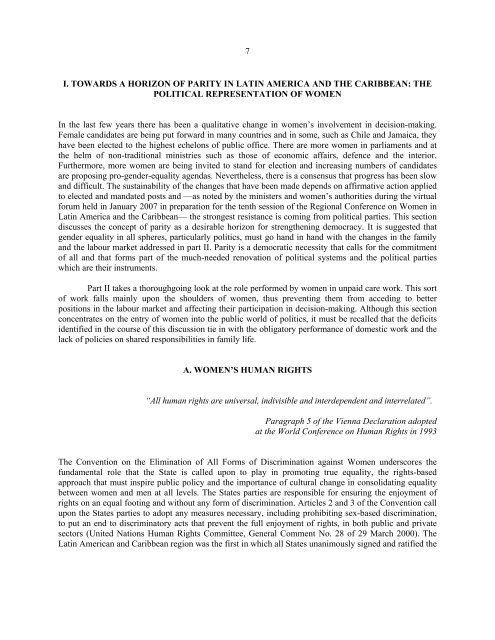Women in Latin America and the Caribbean - Cepal
Women in Latin America and the Caribbean - Cepal
Women in Latin America and the Caribbean - Cepal
You also want an ePaper? Increase the reach of your titles
YUMPU automatically turns print PDFs into web optimized ePapers that Google loves.
7<br />
I. TOWARDS A HORIZON OF PARITY IN LATIN AMERICA AND THE CARIBBEAN: THE<br />
POLITICAL REPRESENTATION OF WOMEN<br />
In <strong>the</strong> last few years <strong>the</strong>re has been a qualitative change <strong>in</strong> women’s <strong>in</strong>volvement <strong>in</strong> decision-mak<strong>in</strong>g.<br />
Female c<strong>and</strong>idates are be<strong>in</strong>g put forward <strong>in</strong> many countries <strong>and</strong> <strong>in</strong> some, such as Chile <strong>and</strong> Jamaica, <strong>the</strong>y<br />
have been elected to <strong>the</strong> highest echelons of public office. There are more women <strong>in</strong> parliaments <strong>and</strong> at<br />
<strong>the</strong> helm of non-traditional m<strong>in</strong>istries such as those of economic affairs, defence <strong>and</strong> <strong>the</strong> <strong>in</strong>terior.<br />
Fur<strong>the</strong>rmore, more women are be<strong>in</strong>g <strong>in</strong>vited to st<strong>and</strong> for election <strong>and</strong> <strong>in</strong>creas<strong>in</strong>g numbers of c<strong>and</strong>idates<br />
are propos<strong>in</strong>g pro-gender-equality agendas. Never<strong>the</strong>less, <strong>the</strong>re is a consensus that progress has been slow<br />
<strong>and</strong> difficult. The susta<strong>in</strong>ability of <strong>the</strong> changes that have been made depends on affirmative action applied<br />
to elected <strong>and</strong> m<strong>and</strong>ated posts <strong>and</strong> —as noted by <strong>the</strong> m<strong>in</strong>isters <strong>and</strong> women’s authorities dur<strong>in</strong>g <strong>the</strong> virtual<br />
forum held <strong>in</strong> January 2007 <strong>in</strong> preparation for <strong>the</strong> tenth session of <strong>the</strong> Regional Conference on <strong>Women</strong> <strong>in</strong><br />
Lat<strong>in</strong> <strong>America</strong> <strong>and</strong> <strong>the</strong> <strong>Caribbean</strong>— <strong>the</strong> strongest resistance is com<strong>in</strong>g from political parties. This section<br />
discusses <strong>the</strong> concept of parity as a desirable horizon for streng<strong>the</strong>n<strong>in</strong>g democracy. It is suggested that<br />
gender equality <strong>in</strong> all spheres, particularly politics, must go h<strong>and</strong> <strong>in</strong> h<strong>and</strong> with <strong>the</strong> changes <strong>in</strong> <strong>the</strong> family<br />
<strong>and</strong> <strong>the</strong> labour market addressed <strong>in</strong> part II. Parity is a democratic necessity that calls for <strong>the</strong> commitment<br />
of all <strong>and</strong> that forms part of <strong>the</strong> much-needed renovation of political systems <strong>and</strong> <strong>the</strong> political parties<br />
which are <strong>the</strong>ir <strong>in</strong>struments.<br />
Part II takes a thoroughgo<strong>in</strong>g look at <strong>the</strong> role performed by women <strong>in</strong> unpaid care work. This sort<br />
of work falls ma<strong>in</strong>ly upon <strong>the</strong> shoulders of women, thus prevent<strong>in</strong>g <strong>the</strong>m from acced<strong>in</strong>g to better<br />
positions <strong>in</strong> <strong>the</strong> labour market <strong>and</strong> affect<strong>in</strong>g <strong>the</strong>ir participation <strong>in</strong> decision-mak<strong>in</strong>g. Although this section<br />
concentrates on <strong>the</strong> entry of women <strong>in</strong>to <strong>the</strong> public world of politics, it must be recalled that <strong>the</strong> deficits<br />
identified <strong>in</strong> <strong>the</strong> course of this discussion tie <strong>in</strong> with <strong>the</strong> obligatory performance of domestic work <strong>and</strong> <strong>the</strong><br />
lack of policies on shared responsibilities <strong>in</strong> family life.<br />
A. WOMEN’S HUMAN RIGHTS<br />
“All human rights are universal, <strong>in</strong>divisible <strong>and</strong> <strong>in</strong>terdependent <strong>and</strong> <strong>in</strong>terrelated”.<br />
Paragraph 5 of <strong>the</strong> Vienna Declaration adopted<br />
at <strong>the</strong> World Conference on Human Rights <strong>in</strong> 1993<br />
The Convention on <strong>the</strong> Elim<strong>in</strong>ation of All Forms of Discrim<strong>in</strong>ation aga<strong>in</strong>st <strong>Women</strong> underscores <strong>the</strong><br />
fundamental role that <strong>the</strong> State is called upon to play <strong>in</strong> promot<strong>in</strong>g true equality, <strong>the</strong> rights-based<br />
approach that must <strong>in</strong>spire public policy <strong>and</strong> <strong>the</strong> importance of cultural change <strong>in</strong> consolidat<strong>in</strong>g equality<br />
between women <strong>and</strong> men at all levels. The States parties are responsible for ensur<strong>in</strong>g <strong>the</strong> enjoyment of<br />
rights on an equal foot<strong>in</strong>g <strong>and</strong> without any form of discrim<strong>in</strong>ation. Articles 2 <strong>and</strong> 3 of <strong>the</strong> Convention call<br />
upon <strong>the</strong> States parties to adopt any measures necessary, <strong>in</strong>clud<strong>in</strong>g prohibit<strong>in</strong>g sex-based discrim<strong>in</strong>ation,<br />
to put an end to discrim<strong>in</strong>atory acts that prevent <strong>the</strong> full enjoyment of rights, <strong>in</strong> both public <strong>and</strong> private<br />
sectors (United Nations Human Rights Committee, General Comment No. 28 of 29 March 2000). The<br />
Lat<strong>in</strong> <strong>America</strong>n <strong>and</strong> <strong>Caribbean</strong> region was <strong>the</strong> first <strong>in</strong> which all States unanimously signed <strong>and</strong> ratified <strong>the</strong>











